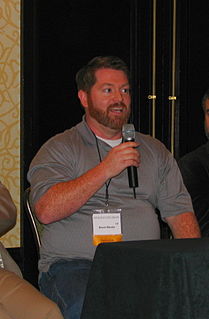A Quote by Mahatma Gandhi
Related Quotes
And violence is impractical, because the old eye for an eye philosophy ends up leaving everybody blind .. It is immoral because it is a descending spiral ending in destruction for everybody. Means and ends are inseparable. The means represent the ideal in the making; in the long run of history destructive means cannot bring about constructive ends.
We will never have peace in the world until men everywhere recognize that ends are not cut off from means, because the means represent the ideal in the making, and the end in process, and ultimately you can't reach good ends through evil means, because the means represent the seed and the end represents the tree.
The end is what you want, the means is how you get it. Whenever we think about social change, the question of means and ends arises. The man of action views the issue of means and ends in pragmatic and strategic terms. He has no other problem; he thinks only of his actual resources and the possibilities of various choices of action. He asks of ends only whether they are achievable and worth the cost; of means, only whether they will work. ... The real arena is corrupt and bloody.
Now it is usual-but not to say normal-for people to interest themselves primarily in means, without noticing that means exist only in relation to ends and that, in accepting certain means, they unconsciously accept the ends that make them so. In other words, they accept whatever philosophy happens to be embodied in the values and institutions of a particular civilation.
War is by definition the indiscriminate killing of huge numbers of people for ends that are uncertain. Think about means and ends, and apply it to war. The means are horrible, certainly. The ends, uncertain. That alone should make you hesitate. . . . We are smart in so many ways. Surely, we should be able to understand that in between war and passivity, there are a thousand possibilities.
In most cases, to be reasonable means not to be obstinate, which in turn points to conformity with reality as it is. The principle of adjustment is taken for granted. When the idea of reason was conceived, it was intended to achieve more than the mere regulation of the relation between means and ends: it was regarded as the instrument for understanding the ends, for determining them.
Life is nothing in itself. It’s a place marker that proves who’s winning, and we are the winners. We are always the winners. There is nothing but the winning. Even winning means nothing. We win because it’s an insult to lose. The ends don’t justify the means. The means don’t justify the ends. There is no one to justify to. There is no justice.” ~ Durzo Blint
The trick is, after all, obvious. The Theist takes terms that can apply to sentient life alone, and applies them to the universe at large. He talks about means, that is, the deliberate planning to achieve certain ends, and then says that as there are means there must be ends. Having, unperceived, placed the rabbit in the hat, he is able to bring it forth to the admiration of his audience.
Economics is a theoretical science and as such abstains from any judgement of value. It is not its task to tell people what ends they should aim at. It is a science of the means to be applied for attainment of ends chosen, not, to be sure, a science of the choosing of ends. Ultimate decisions, the valuations and the choosing of ends, are beyond the scope of any science. Science never tells a man how he should act; it merely shows how a man must act if he wants to attain definite ends.






































